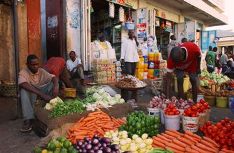
The multi-stakeholder constituencies of the Global Forum on Agricultural Research (GFAR) have prioritized the issue of agro-biodiversity as one of prime global importance. The International Treaty on Plant Genetic Resources in Food and Agriculture (ITPGRFA) recognizes the importance of agricultural research and contains special provisions for the exchange of information, transfer of technology and capacity building related to plant genetic resources.
The work of GFAR and the ITPGRFA converge in the need to expand varietal conservation, exchange and use, and the fair sharing of benefits, to include a wide range of species that have huge local significance and in many cases global market potential. Both GFAR and ITPGRFA are keen to facilitate greater collaboration and synergies among the many programmes addressing these crops, a view that has been echoed through discussion with all those concerned about the future of these species.
Over recent years, regional initiatives and multi-partner international actions related to the International Year of Biodiversity have highlighted these links. There is a strong desire for collaborative action in and between regions in order to achieve development impact at scale. Examples are the biodiversity conservation and use frameworks now articulated for Africa and Asia.
To promote greater international synergy around this crucial agenda, GFAR, with the ITPGRFA Secretariat, held an initial meeting in Rome on January 20-21, 2011. This meeting brought together UN organizations, international research networks and institutions as well as civil society, all concerned with generating, accessing and using knowledge of these crops and with promoting their sustainable use and their value in development. Through productive discussions, these diverse programmes agreed to form a collective movement, open to all and provisionally termed the Development Opportunity in Diversity Initiative, with the goal of collaborative action to strengthen the role and value of agro-biodiversity and its sustainable use in contributing towards development aims.
Through this meeting the potential importance of these crops, based on three key development objectives (pillars), was highlighted:
1. Nutrition and health - through production of foods, providing household/community food security and a diet diversity naturally rich in micronutrients;
2. The resilience of farming systems and environmental services at field or landscape level (e.g. to manage pests and diseases or maintain soil fertility); and
3. Source of income for resource-poor small farmers, enabling market opportunities and value addition potential, especially for poor producers who have very little land.
A short-term action plan was proposed:
1. Set up inclusive working groups to grow collaboration around each of the 3 development pillars;
2. Organize a side event at the fourth session of the Governing Body of the International Treaty in March 2011 highlighting the agenda and its development linkages (see below); and
3. Identify and pursue appropriate subsequent events (e.g. Science Forum, 2011; Rio plus 20, 2012) to build collaborative actions that can achieve large scale development impacts.
Three key messages were highlighted:
1. We need to initiate solid and inclusive actions to build concerted and practical actions on sustainable use;
2. We need to clearly demonstrate the added value of regional and international actions in support of national needs; and
3. We must create the evidence base for wider commitment and actions.
